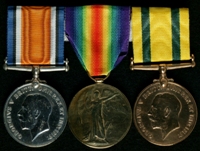

(L to R) British War Medal; Allied Victory Medal; Territorial Force War Medal
Robert was born in around 1879. We don't know anything about his family or his early life.
We know he was living in Manchester in the late 19th or early 20th Century, because he joined the 4th Volunteer Battalion of the Manchester Regiment. This unit was based in Burlington Street, near Manchester University. Robert would have trained as a soldier in the evenings and at weekends, whilst keeping his civilian job. We don't know what that was.
The Volunteer Force was disbanded and replaced by the Territorial Force in April 1908. Robert continued to serve in what was now the 7th Battalion of the Manchester Regiment. He served for at least 4 years after 1908.
At some point Robert's civilian work took him to Glasgow, and he left the 7th Battalion. He was still there when the First World War broke out in August 1914. Robert rejoined the Territorial Force, enlisting in the 5th (City of Glasgow) Battalion of the Highland Light Infantry. He had rejoined before the 30th September. We know this because otherwise he would not have been eligible for the Territorial Force War Medal.
The 1/5th Battalion sailed to Gallipoli in May 1915. Robert did not go with them. We don't know what job he had that kept him in the UK, but his long experience suggests he could have been involved in training new recruits. He served with the 2/5th or the 3/5th Battalion.
In March 1917 members of the Territorial Force were given new service numbers. We don't know Robert's old number, but his new one was 200253. He went overseas at some point after this. The 1/5th Battalion was stationed in Egypt until April 1918, then it moved to France.
After he went overseas Robert was transferred to the 1/4th Battalion of the King's Own Scottish Borderers, although we don't know exactly when this happened. He was given a new service number: 202233. This unit also moved from Egypt to France in April 1918. Robert held the rank of Sergeant during the war.
After the war ended Robert returned to the Manchester area. We don't know whether he rejoined the 7th Battalion, but he did begin to play an active role in their social events as a member of the Old Comrade's Association. He was always referred to as a Company Sergeant Major (CSM). We don't know whether he reached this rank before he left the 7th Battalion, or during the First World War.
Robert was a keen rifle shot. He was a member of Manchester Rifle Club and competed for the OCA against teams of current soldiers at several competitions during the 1920's. He was also a keen supporter of the Regimental Chapel in Manchester Cathedral, and the Regimental Museum, which was located in Ladysmith Barracks, Ashton.
By 1932 Robert had been elected Treasurer of the 7th Battalion OCA. He attended numerous events on its behalf. Many of these were the funerals of members, including Lieutenant Colonel John Newton Brown's on the 11th March 1932. John's medals are in the Museum of the Manchester Regiment collection.
Happier responsibilities also came with the job. The Governor -General of Sudan; General Sir Francis Wingate had been very impressed by the 7th Battalion when they were stationed in Khartoum in 1914 and became their Honorary Colonel. He was very popular with the Battalion and Robert was one of the OCA members chosen to meet him and his wife when they made a very rare trip to Manchester in 1931. Another member of the party was William Scott, whose medals are also in the Museum's collection. He also visited the Wingates in London on their 50th wedding anniversary in June 1938.
Robert remained Treasurer for the rest of his life. He was ill enough over the winter of 1936-37 that the OCA Annual General Meeting had to be postponed until he had 'sufficiently recovered to be able to attend and give one of his usual lucid reports'. As Treasurer he was responsible for overseeing the OCA's finances. A major role of the OCA was providing financial help to members in difficulties, so this was an important job. During the 1930's the Great Depression and the increasing age of members meant that the funds required increased significantly. The OCA paid out £16 in 1935-36, but £28 in 1936-37.
In April 1939 William Scott became Honorary Secretary of the OCA. The two men led the OCA through the Second World War, until William retired in 1946. He was succeeded by Fred Bamber, whose medals are also in the Museum's collection. Fred and Robert worked to ensure Second World War veterans of the 7th Battalion joined the OCA, so that it would have a future beyond the ageing First World War generation.
Robert was forced to miss the 1948 reunion because of ill health. He was missed and those present hoped he 'would soon be restored to health and strength again so that we could have his cheerful company among us'.
Robert died in December 1949. He was 70 years old. His comrades, who had always called him Bob, missed his 'expansive smile' and considered him 'a great fellow'. At his funeral Bob 'left instructions that there should be no flowers or mourning'. This was 'typical of his happy life'.
Robert was married, although we don't know the name of his wife or whether they had any children. Mrs Campbell had 'backed our Bob up to the hilt' with her work behind the scenes. Robert's medals were donated to the Museum of the Manchester Regiment shortly after he died.




